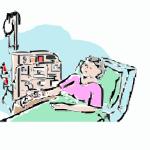Every time I'm in Poland, I make several trips to our favorite massage therapist. Because of the exchange rate and the lower cost of labor, I can get an hour-long massage for just over $30.
healthcare
While our culture is preoccupied with violations of consumer data privacy yielding targeted marketing for shoes, travel or food preferences, law and advertising firms are leading a more nefarious erosive charge on patient privacy.
Protected personal health information has traditionally been exempt from privacy concerns, given the unique nature of its scope and regulation, until the advent of direct-to-consumer (DTC) genetic testing, forced implementation of electronic medic
Early on January 27, 2018, The Most Interesting Man in the World passed away at the age of 91.
Value-based healthcare is the refrain for all the stakeholders, patients and their advocacy groups, physicians and their societies, payers both insurance and government. We must replace payment for volume or procedures with payment for value.
Bad boys, bad boys
What'cha gonna do?
What'cha gonna do when they come for you?
This year brought about a number of public discussions surrounding not only less mainstream medical conditions, but also physically and emotionally challenging and ethically complex ones.
I had a wonderful time filming at CUNY-TV studios this week in New York City for Smith and Sabatino TV and Radio about the state of medical practice today.
Here’s a novel approach, appreciate and value the physicians in actual practice and watch job satisfaction soar.
In an effort to combat patient non-compliance with medications, the FDA just approved the first pill with an ingestible tracking sensor.











